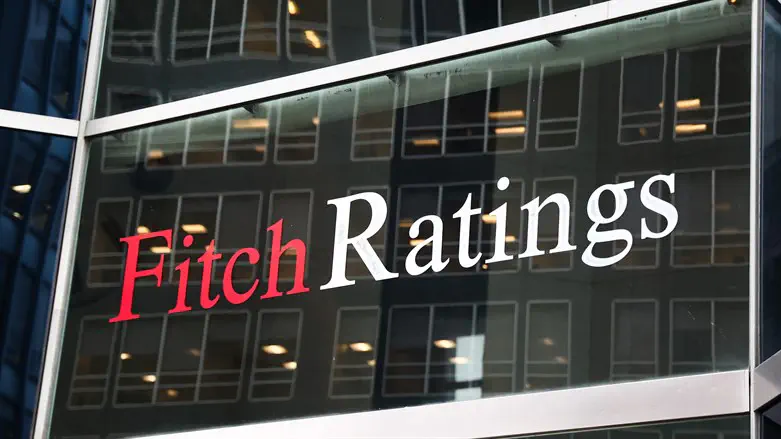
International credit ratings company Fitch announced on Monday that it has downgraded Israel's credit rating to “A” from “A+” with a negative outlook.
“The downgrade to 'A' reflects the impact of the continuation of the war in Gaza, heightened geopolitical risks and military operations on multiple fronts. Public finances have been hit and we project a budget deficit of 7.8% of GDP in 2024 and debt to remain above to 70% of GDP in the medium term. In addition, World Bank Governance Indicators are likely to deteriorate, weighing on Israel's credit profile,” Fitch said in its statement announcing the move.
“In our view, the conflict in Gaza could last well into 2025 and there are risks of it broadening to other fronts. In addition to human losses, it could result in significant additional military spending, destruction of infrastructure and more sustained damage to economic activity and investment, leading to a further deterioration of Israel's credit metrics,” it added.
Fitch also cited tensions between Israel and Iran and its allies, which it noted “remain high”, as well as the war in Gaza. “The war will likely continue until end-2024 with a risk of intense operations continuing beyond. This implies continued high spending on immediate military needs, and disruptions to production in the border areas and in tourism and construction. Israel has demobilized most of its reservists, reducing the impact on the workforce,” it said.
Fitch also noted what it described as “fractious” domestic politics in Israel. “An emergency government was formed to include parties beyond the original coalition and to form a war cabinet including National Unity party leader Benny Gantz. The emergency government was dissolved in June 2024 and the original coalition returned to power. It could remain until the next elections in October 2026, although coalitions rarely last a full term and this one will face pressure for early elections, given the events of October 2023 and controversy over the conscription of [haredi] Jews.”
Israel’s Accountant General, Yali Rothenberg, said in response to Fitch’s decision, "The continuation of the war and the increase in geopolitical risks affect the fiscal data and, accordingly, the credit rating profile of the State of Israel. Despite the war, the State of Israel shows very high accessibility to the capital markets in Israel and internationally, with stable financing conditions and strong demand for debt in the local market."
He added, "The Israeli economy is strong, innovative, diverse, has deep financial markets and will know how to deal with all the challenges we face. However, we must create as much certainty as possible for the Israeli economy, investors and rating companies.”
"To this end, action must be taken as soon as possible to form a responsible state budget for 2025, based on a process of rebuilding the fiscal reserves through a gradual decrease in the debt-to-GDP ratio. This, alongside the promotion of growth engines, investment in infrastructure, meeting social needs and an orderly response to the needs of the defense establishment," said Rothenberg.
Finance Minister Bezalel Smotrich responded to the downgrading of Israel's credit rating by Fitch and said, "The State of Israel is in the midst of an existential war, the longest and most expensive in its history. A war that is being waged on several fronts at the same time and has been going on for almost a year. The downgrade following the war and the geopolitical risks that it produces is a natural one."
Smotrich added, "Israel's economy is strong and we are navigating it correctly and responsibly. The economic indicators point to the economy's robustness and the high trust the markets have in us.”
"With the help of God, we will win the war on all fronts, restore security and raise the economy from a war to a path of growth. We will pass a responsible budget that will continue to support all the needs of the war until victory, while maintaining fiscal frameworks and promoting growth engines. Very quickly, the credit rating will also be upgraded again," said Smotrich.
This past April, Fitch reaffirmed Israel's credit rating at an A+ level, the removal of the "Negative Watch" and an update of the rating outlook from "Stable" to "Negative."
Several weeks later, in wake of the Iranian drone and missile attack on Israel, ratings agency S&P Global cut Israel's long-term ratings to A-plus from AA-minus.
"We forecast that Israel's general government deficit will widen to 8% of GDP in 2024, mostly as a result of increased defense spending," S&P Global said at the time.
